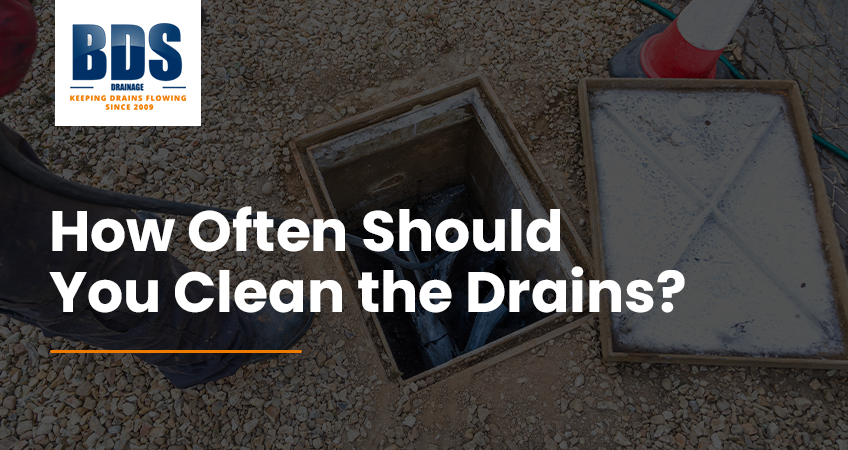A well-maintained drainage system is crucial for a healthy home environment. Neglecting your drains can lead to unpleasant odours, slow drainage, and even costly repairs.
This post will guide you through the signs that your drains need clearing, various methods to clear them, and how often this task should be performed to ensure your home remains in top shape.
Signs your drains need clearing
Identifying when your drains need attention can save you time and money. Here are some common indicators that it’s time to clear your drains:
Slow drainage
One of the most noticeable signs that your drains are clogged is slow drainage. If water takes longer than usual to empty from your sink, bathtub, or shower, it’s a clear indication that there’s a blockage somewhere in the pipes. This can be caused by a build-up of hair, grease, soap scum, or other debris that has accumulated over time.
Gurgling sounds
Another tell-tale sign of a clogged drain is the presence of gurgling sounds. These noises occur when air is trapped in the pipes due to a blockage. The air gets displaced by water, causing the characteristic gurgling sound. If you hear these noises coming from your drains, it’s time to take action.
Foul odours
Unpleasant smells emanating from your drains are a strong indication that they need clearing. These odours are typically caused by decomposing organic matter trapped in the pipes, which can create a breeding ground for bacteria. Ignoring these smells can lead to more significant problems, so it’s essential to address them promptly.
Understanding drain clearing methods
Clearing your drains can be approached in several ways, depending on the severity of the blockage and your level of expertise. Here’s an overview of some common methods:
DIY solutions for blocked drains

Use a plunger
For minor blockages, DIY solutions can be quite effective. One popular method involves using a plunger to dislodge the obstruction. Simply place the plunger over the drain and create a seal, then pump it up and down vigorously to create suction and push the blockage through.
Baking soda and vinegar
Another DIY option is to use a mixture of baking soda and vinegar. This is most effective for minor blockages in areas such as a bathroom sink. Pour half a cup of baking soda down the drain, followed by half a cup of vinegar. Allow the mixture to sit for about an hour, then flush it with boiling water. This combination can help break down grease and other debris.
Professional services for blocked drain pipes

For more severe blockages, it’s best to enlist the help of professional drain cleaning services. Professionals use advanced equipment, such as CCTV drain surveys, drain snakes and hydro-jetting, to effectively clear stubborn blockages. A drain snake, also known as an auger, is a long, flexible cable that can reach deep into the pipes to remove clogs. Hydro-jetting involves using high-pressure water to blast away any build-up, ensuring the pipe is thoroughly cleaned.
Chemical drain cleaners

While chemical drain cleaners are readily available and can be effective, they should be used with caution. Drain cleaning chemicals are harsh, can damage your pipes over time and pose a risk to your health. If you choose to use a chemical drain cleaner, follow the instructions carefully and avoid overuse.
How often should drains be cleared?
Determining how often to clear your drains depends on several factors, including household size, usage, and the type of drain. Here’s a closer look at these considerations:
Household size
The number of people living in your home can significantly impact how often your drains need clearing. Larger households typically generate more waste, leading to more frequent blockages. In contrast, smaller households may not need to clear their drains as often.
Usage
The frequency with which you use your drains also plays a role. For example, kitchen sinks and bathroom drains tend to accumulate debris more quickly than other drains in the house. If you cook frequently or have multiple people using the same bathroom, you may need to clear these drains more often.
Internal vs external drains
It’s also essential to consider the type of drain. Internal drains, such as those in your kitchen or bathroom, generally require more frequent maintenance due to the build-up of organic matter. External drains, like those in your garden or driveway, may need less frequent attention but can still become clogged with leaves, dirt, and other debris.
General recommendations
While each household is unique, a general rule of thumb for regular drain cleaning is to clear your drains every six months. However, if you notice any of the signs mentioned earlier, it’s essential to address the issue sooner.
Preventative measures to avoid frequent clearing

Preventative maintenance can help you avoid the hassle of frequent drain clearing. Here are some tips to keep your drains clear for longer periods:
Use drain guards
Installing drain guards or strainers can help catch hair, food particles, and other debris before they enter your pipes. These inexpensive devices can significantly reduce the likelihood of blockages.
Be mindful of what goes down the drain
Avoid pouring grease, oil, and food scraps down your kitchen sink, as these substances can accumulate and cause clogs. In the bathroom, try to minimise the amount of hair and soap scum that goes down the drain.
Regular maintenance
Performing regular maintenance, such as flushing your drains with hot water once a week, can help prevent build-up. Additionally, consider using a natural enzyme-based drain cleaner monthly to break down organic matter and keep your pipes clear.
Conclusion
Maintaining clear drains is essential for a healthy home environment. By understanding the signs of a clogged drain, familiarising yourself with various clearing methods, and knowing how often to perform maintenance, you can keep your drainage system in top shape. Don’t forget to implement preventative measures to avoid frequent clearing and ensure your home remains free of unpleasant odours and slow drainage.
Need professional assistance?
Call on our drain unblocking specialists!

If you need professional help, BDS Drainage offers expert services to address even the most stubborn drain blockages.
Our team is experienced, knowledgeable, and dedicated to providing affordable solutions for all your drainage needs. Contact us today to get started on maintaining a healthy and efficient drainage system.


Leave a Reply